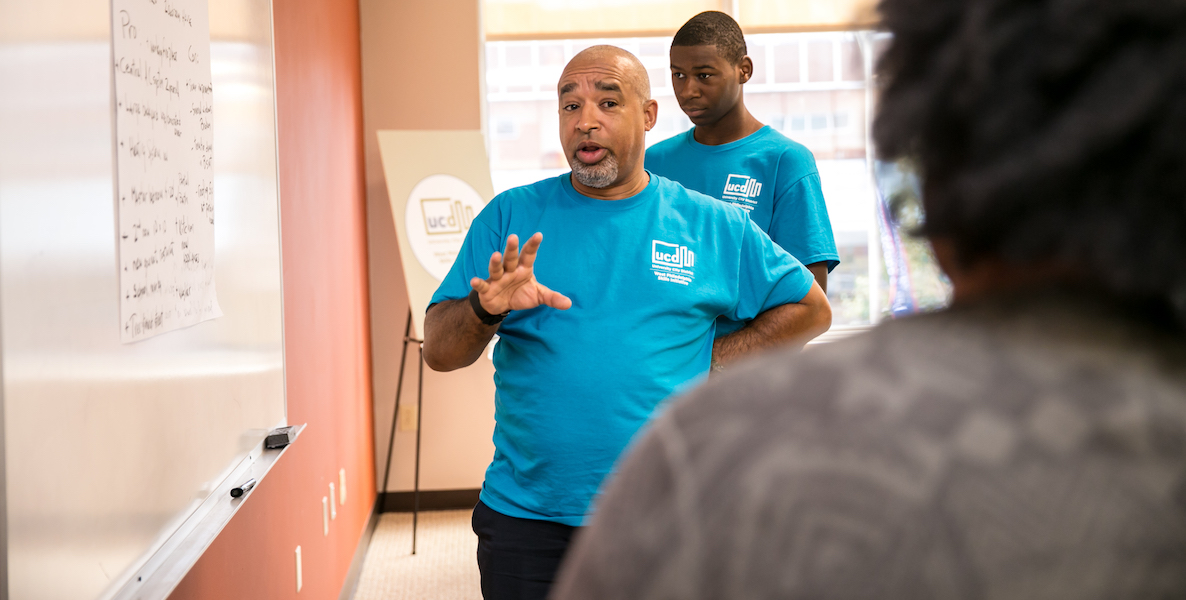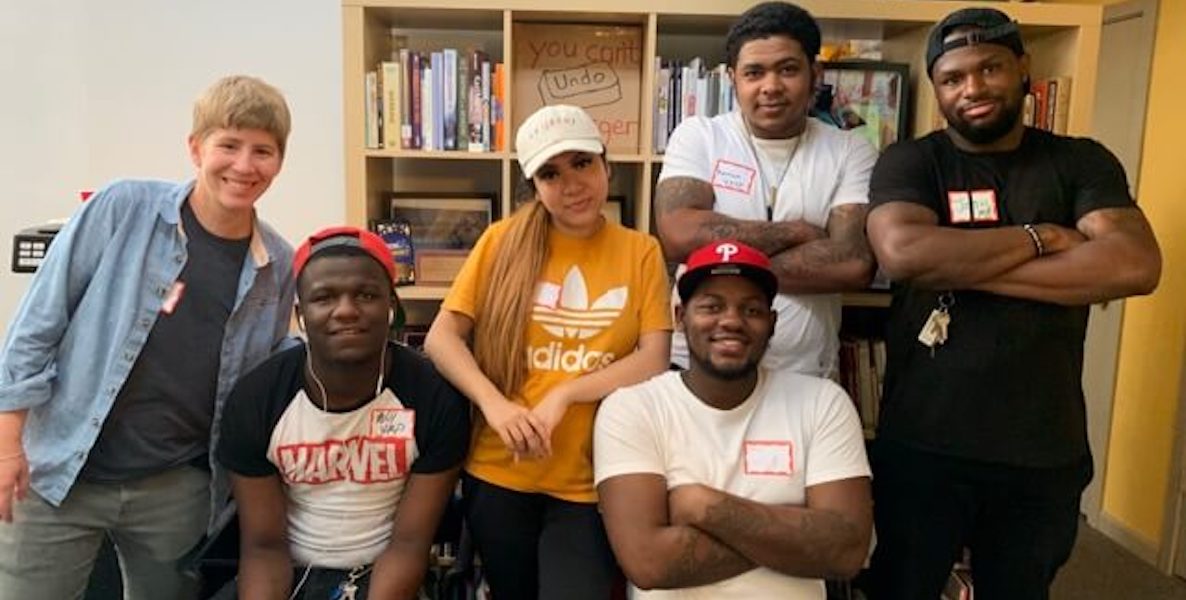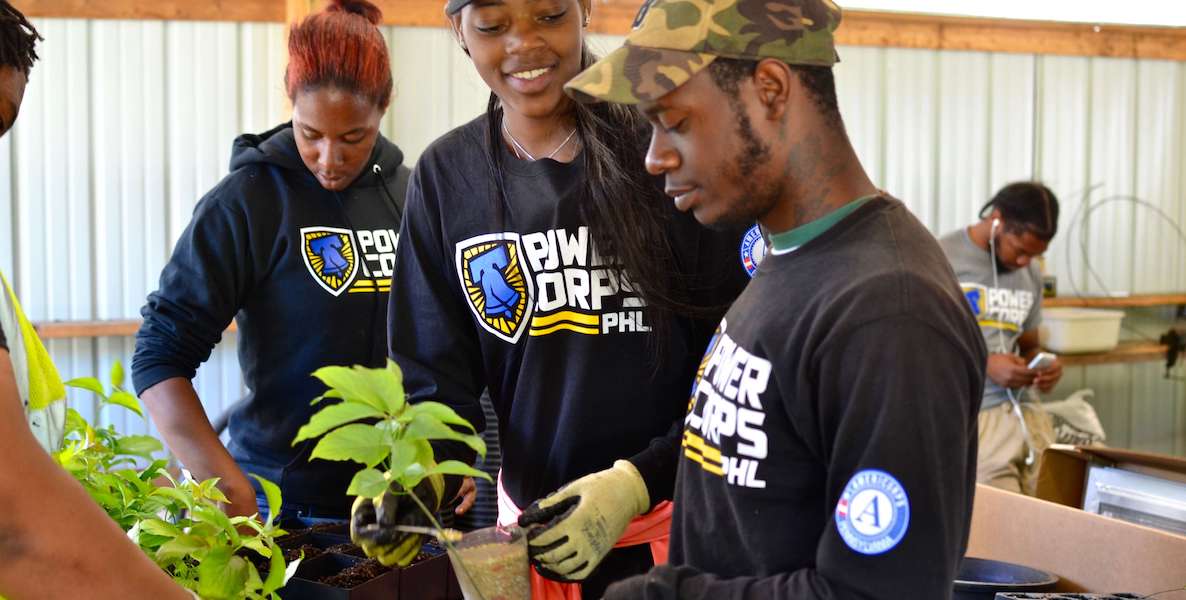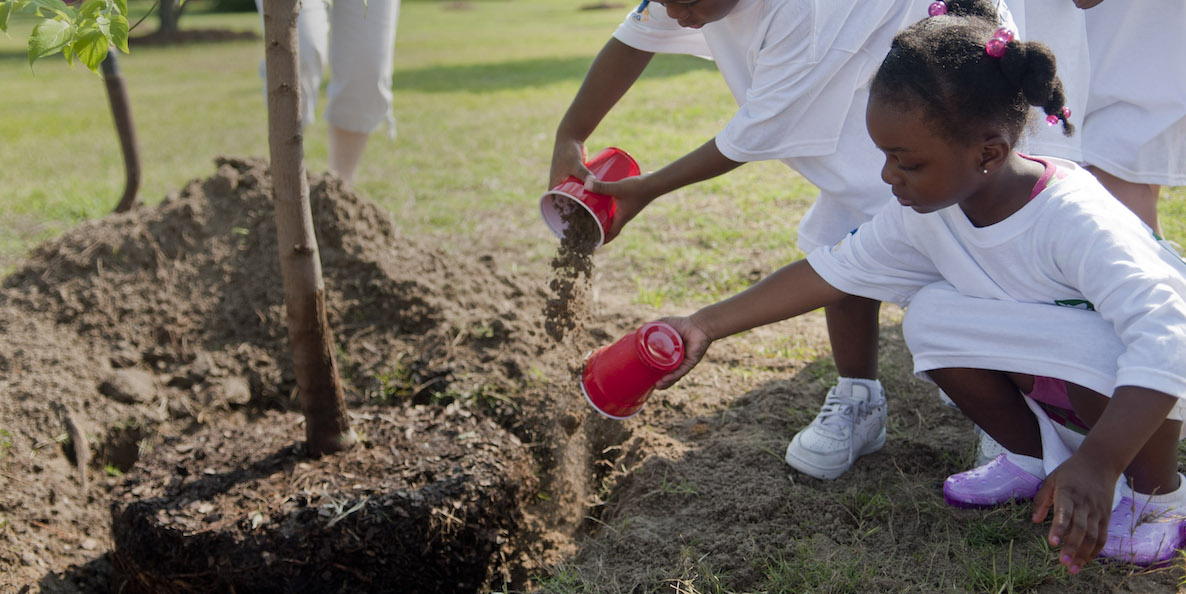Cashmir Woodward knew she didn’t want to stay in her job as a home health aide forever. But as a single mom with a juvenile record, she didn’t think she had many other options.
Then, a friend told her about PowerCorpsPHL, a City of Philadelphia workforce development initiative operated by the nonprofit Education Works, that thoughtfully addresses three of our city’s biggest challenges—youth disconnection; youth violence; and citywide environmental sustainability—by braiding together solutions that are effective, impactful and research-backed.
Within weeks of enrolling in the program, a support staffer at PowerCorpsPHL had helped Woodward get childcare and social security benefits for her son, and helped her begin the process of getting her juvenile record expunged.
![]() Now, Woodward is about 20 weeks into the program, getting paid to train to work in green stormwater infrastructure (GSI)—a field that offers long-term career and salary growth, and the chance to make a difference on a larger-scale than her previous job.
Now, Woodward is about 20 weeks into the program, getting paid to train to work in green stormwater infrastructure (GSI)—a field that offers long-term career and salary growth, and the chance to make a difference on a larger-scale than her previous job.
“I felt like what I was doing before PowerCorpsPHL wasn’t enough, and now I can have a real impact on our city and its future,” she says. “I want other young people, including those with records, to know that PowerCorpsPHL will accept you without judgement and work with you, no matter what.” Notably, while the citywide recidivism rate for Philly is 45 percent, the rate for PowerCorpsPHL members is 8 percent.
A RAND Corporation study released last month found that 75 percent of think people are not graduating with the skills needed for 21st century jobs, and a Department of Labor report released in 2016 found that government job-training programs were largely ineffective.
think people are not graduating with the skills needed for 21st century jobs, and a Department of Labor report released in 2016 found that government job-training programs were largely ineffective.
But studies have shown that service-year programs—those, like PowerCorpsPHL, that pay participants to develop real-world skills with hands-on service—not only improve career opportunities for youth and empower them financially and emotionally, but save our country billions of dollars.
“I felt like what I was doing before PowerCorpsPHL wasn’t enough, and now I can have a real impact on our city and its future,” Woodward says.
Since 2013, the organization, which was launched as a hybrid initiative between Philadelphia Youth Network and Education Works under Mayor Michael Nutter in collaboration with AmeriCorps, has welcomed 662 Philly youth through it’s multi-phase program.
About 60 percent of incoming members have adult criminal records; 10 percent come through the foster system; others come from alternative high schools, via word-of-mouth referrals or while seeking a veritable gap year to figure out plans for their future. (All members must have a GED or high school diploma.)
Members receive training in 21st-century fields through “Industry Academies”: Urban Forestry Academy, Green Stormwater Infrastructure (GSI) Academy, and Solar and Electrical Academy.
A new cohort of about 60 members starts each September and March.
During phase one, which lasts 17 weeks, members earn $10 an hour while focusing on work-readiness, career-exploration and team-building activities, like planting trees, which serves the benefits of increasing Philly’s canopy, yes, but also of building trust and boosting confidence.
“Members can see the tangible results of their efforts; knowing that they’ve transformed Philly’s landscape and that those trees will be here for the next 100 years is powerful,” says Julia Hillengas, PowerCorpsPHL’s executive director, while pointing out recently planted trees along Kelly Drive.
Phase two comes with three options, which vary in duration from two 19-week sessions to 46 weeks. This is when members pursue Industry Academies, learning in-demand skills alongside government, nonprofit and industry mentors, like the Philly Water Department (PWD) or Bartlett Tree Experts.
Participants can seek career-specific training in other fields of interest and enroll in post-secondary school; or they can become assistant crew leaders (ACLs) at PowerCorpsPHL, receiving on-the-job training in peer leadership and community outreach.
In phase two, all members earn $11 per hour. Attrition is about 25 percent in phase one, and only 15 percent in phase two.
PowerCorpsPHL facilitates connections to employment or post-secondary education for about 92 percent of its members, and offers lifelong access to support services for all alumni.
Starting wages for alumni range from $12 to $18 per hour, depending on what industry they pursue. That may sound meager to outsiders, but PowerCorpsPHL is mindful of training members in fields that have high growth potential and a clear-cut ladder to climb.
And PowerCorpsPHL doesn’t solely address job preparedness and education: The organization sees members holistically, working with them to knock down barriers that might otherwise hinder their success.
A full-time social worker counsels members on their mental health needs and can refer them to medical clinics or for additional support.
Kea Greene, PowerCorpsPHL’s supportive services advisor (along with a colleague who works part-time when not at CHOP), helps members get their SNAP benefits, or sign up for childcare through CCIS.
She helps them claim AmeriCorps tuition benefits ($6,000 per year of service) and fill out the kind of tedious paperwork that can fall by the wayside for anyone, let alone someone struggling with food insecurity or homelessness, as incoming members frequently do.
Funding for the program comes from many channels.
AmeriCorps funding is awarded to the city, and distributed to PowerCorpsPHL. Additionally, four city departments pay into a match for the grant: Office of Workforce Development, Department of Human Services, Philadelphia Water, Philadelphia Parks & Recreation.
Non-city funding comes from Philadelphia Works and private foundations and donors, William Penn Foundation and Spring Point Partners (also a supporter of The Citizen).
“Where so many of us come from, we’re used to negative things and broken promises,” Lopez says. “I had to learn to trust the team here, and they never let me down. I want others to see me and my journey and know that it can be theirs too.”
It’s hard to quantify a per-member budget, given that members stay anywhere from four months to two years, but 47 percent of the organization’s total budget goes toward wages, and the average budget-per-member is approximately $26,000.
“We have some really fun and quirky partners and champions who come from all walks of life, and the common thing among them is that they get that people are amazing and complex and beautiful, and they’re going to look all different ways,” says Hillengas, a former teacher and community organizer who’s been with PowerCorpsPHL for seven years. “What PowerCorpsPHL is really good at is creating a space of seeing people, valuing them, respecting them. We talk a lot about love.”
Allisa “Angel” Lopez went through the PowerCorpsPHL training in 2017 and now works on staff as the alumni advisor, organizing professional development workshops and helping out in whatever way she’s needed.
Like Lopez, 20 percent of PowerCorpsPHL staff have come through the program. Lopez says that PowerCorpsPHL changed her life in unimaginable ways.
“I beat the statistics,” she says one winter afternoon from PowerCorpsPHL’s new training center on the ground floor of the former Vaux Big Picture High School building in Sharswood. “I come from the ‘hood. I dropped out of high school twice. I was in foster care. Now, I’m a first-generation college student.”
More than that, Lopez says, she’s a role model, proof to others coming through the program that, with PowerCorpsPHL’s support, they can overcome the odds—and that she truly understands them.
![]() “Where so many of us come from, we’re used to negative things and broken promises,” she says. “We come from environments where our trust is broken, so we often have a wall up. I had to learn to trust the team here, and they never let me down. I want others to see me and my journey and know that it can be theirs too.”
“Where so many of us come from, we’re used to negative things and broken promises,” she says. “We come from environments where our trust is broken, so we often have a wall up. I had to learn to trust the team here, and they never let me down. I want others to see me and my journey and know that it can be theirs too.”
While women typically make up about 20 to 25 percent of teams in GSI, Woodward says she’s trying to recruit more women to enter the field. “The guys do not light up on us at all. They actually make sure that we can do just what they can do,” she says.
She’s particularly grateful for a women’s leadership program that Greene started, called Ladies First. Men, too, get extra support through a program called Healing Hurt People.
Greene, Hillengas, Lopez and the rest of the 29-person PowerCorpsPHL staff believe in supporting crew members any way they need to. Lopez will call members to make sure they’re up for work in the morning. That dedication comes from the staff’s belief in the potential of every single member who joins their ranks.
Says Greene, “We know that if they complete the program, then PowerCorpsPHL is going to change their lives.”
Want more jobs news? Check out these related posts:
- This West Philly jobs initiative is the model of inclusive growth cities need
- Sunday Love Project expands to help the homeless find restaurant jobs
- Philly businesses step up to help people with disabilities find good jobs
- First Step Staffing connects vulnerable people with jobs in Philadelphia











